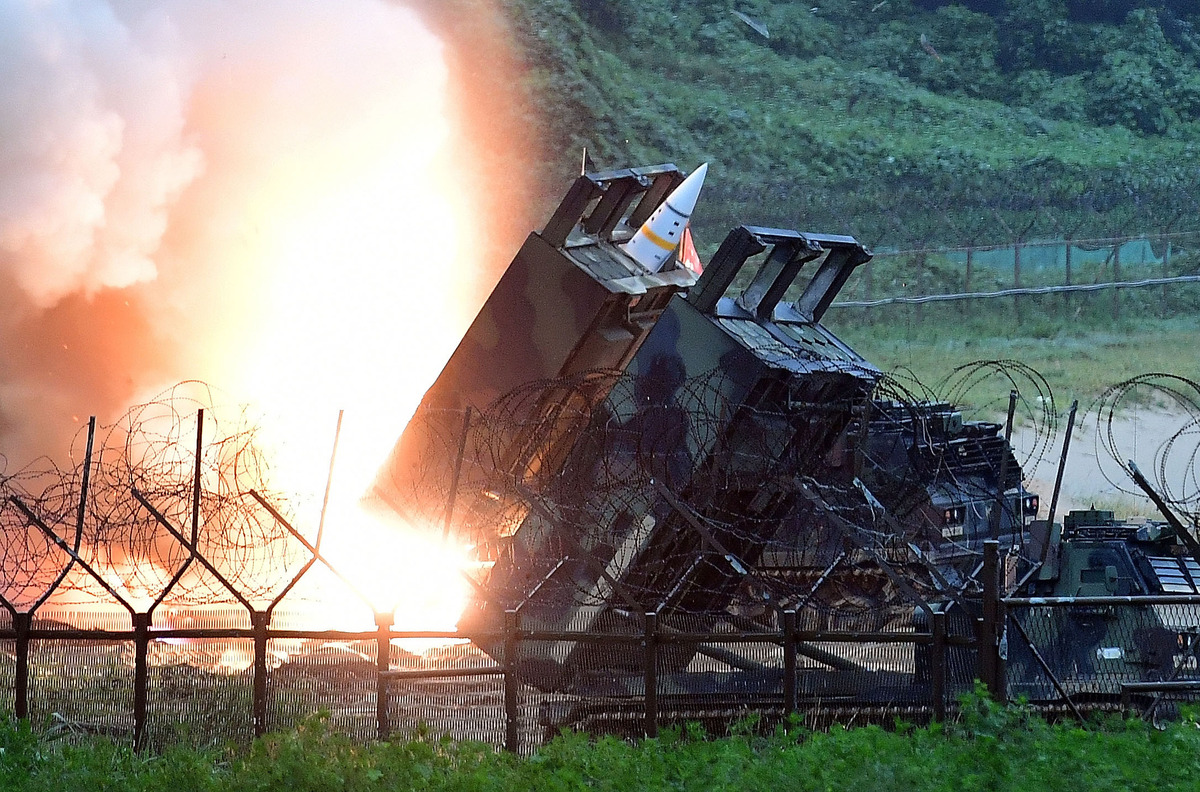Uncommon Knowledge
Newsweek is committed to challenging conventional wisdom and finding connections in the search for common ground.

The U.S. has allowed Ukraine to use American weapons to strike into Russia, but with limits—Kyiv cannot turn its Army Tactical Missile System (ATACMS) missiles to look across the border.
President Joe Biden greenlit Ukrainian strikes on Russian soil with some U.S.-donated weapons to help Kyiv fend off Moscow’s weekslong offensive into the northeastern Kharkiv region, U.S. officials said last week.
U.S. Secretary of State Antony Blinken said during a visit to the Czech capital, Prague, on Friday that Ukraine had for weeks requested the go-ahead to use U.S.-provided weapons against forces inside Russia after Moscow opened the new front in Kharkiv.
Commenting on the significant policy shift from Washington, Blinken said that the U.S. had adapted “time and again,” adding: “We’ve adjusted, we’ve provided Ukraine with the systems, the weapons it’s needed.”
But long-range strikes, including the U.S.’s ground-launched ATACMS missiles, are still off-limits. For some, it’s sensible. For others, it’s hamstringing Ukraine when they sorely need a boost.
The move shows an “excessive fear” in Washington that Russia would somehow escalate the conflict, argued retired Lieutenant General Ben Hodges, former commander of U.S. Army Europe. “The priority is escalation management,” he told Newsweek, saying he wholeheartedly supports allowing Ukraine to strike key Russian targets with ATACMS.
Last week, several Republican representatives, including House Foreign Affairs Committee Chairman Michael McCaul, penned an open letter criticizing the Biden administration’s decision, writing: “To win this war of self-defense against Russia’s aggression, Ukraine must be allowed to use U.S.-provided weapons against any legitimate military targets in Russia, not just along the border near Kharkiv.”
Newsweek has contacted the White House for comment.
But withholding approval for Ukraine to fire ATACMS into Russia is averting a possible nuclear crisis, argued Daniel Rice, a former adviser to Ukraine’s military and current president of American University Kyiv.
Ukraine does not have nuclear weapons. But with U.S.-made ballistic weapons heading toward Russia, “anything can happen,” said Rice. Artillery being fired into Russia cannot be allowed to be confused for a nuclear strike, particularly as Ukraine has been targeting Russian radars designed to detect nuclear strikes, he told Newsweek.
However, Matthew Savill, military sciences director at the London-based Royal United Services Institute think tank said that while ATACMS missiles are tactical ballistic missiles, they are a lot smaller than nuclear-armed ballistic missiles, and Russia knows Ukraine does not wield nuclear weapons.
It’s not clear whether long-range strike capabilities could be up for discussion in the coming weeks, with Ukraine preparing for another possible wave of Russian attacks designed to overstretch Kyiv’s resources in the north, tangled up in bitter clashes in the east.
Ukraine can currently use shorter-range rockets fired by High Mobility Artillery Rocket Systems (HIMARS) to reach a certain distance into Russian territory, striking some of Moscow’s support bases as Russian forces are about to assault into the northeast, Savill told Newsweek.
Sanctioned ATACMS use, however, would extend Ukraine’s hand to air bases for fighter-bombers and helicopters beyond the reach of HIMARS in several southern Russian regions, like Voronezh, he added.
Ukraine has received several waves of ATACMS since fall 2023, giving Kyiv’s troops the firepower to strike high-value Russian assets far behind the front lines—not to be confused with the border. Ukraine debuted cluster-variant ATACMS in October, and longer-range versions were authorized earlier this year.
In late April, National Security Adviser Jake Sullivan said President Joe Biden had authorized sending a “significant number of ATACMS missiles” to Ukraine in February.
ATACMS immediately proved an effective tool. Ukrainian and Russian sources, as well as open-source analysts, have attributed a string of damaging Ukrainian attacks on Moscow’s facilities in Russian-controlled mainland Ukraine and the annexed Crimean Peninsula to ATACMS.
Long-range capabilities, whether it be ATACMS, British- and French-provided air launched missiles or the German Taurus—which Berlin has not provided to Kyiv—would help Ukraine strike Russian logistics, headquarters and key artillery, Hodges said. A single type of weapon may not be a gamechanger, but it will give Kyiv a hand up, he argued.
Striking within Russia, however, has long been a touchy subject with Ukraine’s Western allies keen to avoid escalating the conflict. Kyiv has typically skirted claiming official responsibility for drone attacks inside Russia, such as on key air bases used to launch strikes on Ukraine.
But the mood has changed. Ukrainian President Volodymyr Zelensky told The Guardian in an interview published on Friday that it was “absolutely illogical” for Ukraine to have Western weapons and “see the murderers, terrorists, who are killing us from the Russian side.”
“I think sometimes they are just laughing at this situation,” he added.
Several leading NATO nations, including France and Germany, signaled their permission for Ukraine to use weapons they provide to strike inside Russia last week. French President Emmanuel Macron, said in a joint press conference with German Chancellor Olaf Scholz that Paris and Berlin believed Ukraine should be allowed to target sites used to launch missiles at Ukraine.
“But shouldn’t allow them to hit other targets in Russia and civilian or other military sites in Russia,” Macron added.
Russia railed against the NATO statements, with President Vladimir Putin saying that “constant escalation can lead to serious consequences.”
“Russia regards all long-range weapons used by Ukraine as already being directly controlled by servicemen from NATO countries,” added the former Russian president and current deputy chair of Russia’s security council, Dmitry Medvedev. “This is no military assistance, this is participation in a war against us.”
Newsweek is committed to challenging conventional wisdom and finding connections in the search for common ground.
Newsweek is committed to challenging conventional wisdom and finding connections in the search for common ground.